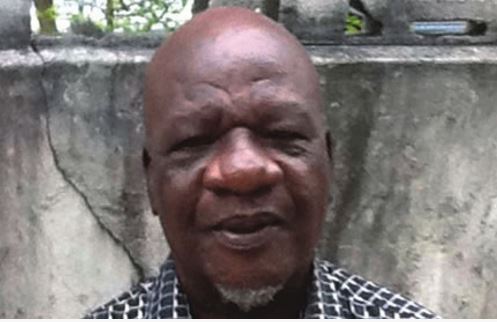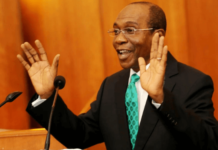
Eighty-year-old renowned broadcaster, journalist and music critic, Benson Idonijie, tells ARUKAINO UMUKORO about his career
When and where were you born?
I was born in a town called Otuo in Owan East Local Government, in Edo State on June 13, 1936. My childhood was very exciting. Then, we looked up to our teachers and wanted to be teachers like them.
Which schools did you attend?
For my primary education, I attended St. Stephen’s School, Otuo in the 1940s; and then Holy Trinity Grammar school from 1949 to 1954. From there, I proceeded to Yaba College of Technology, Lagos, where I studied Communications Engineering from 1955 to 1957.
Your closeness to Fela is well documented. What are some fond memories you can recollect about your friendship?
I have shared almost everything about that, but I have not shared this particular one before. It took place in 1966, I think. Then, Fela and I drove to Ghana for the first time. We travelled by road and got to Togo. There we were stopped by a Gendarme, (a para military police officer in French-speaking countries) there. It was around 6pm and Fela was driving. The policeman asked us to put on the car headlamps, but it was still quite bright outside. Fela said we shouldn’t mind him and he drove off. Shortly after, about six armed policemen surrounded the car and arrested us. We were locked up in the cell. They thought Fela was the driver and I was his boss. Fela was in the cell for about two hours while I was outside pleading on our behalf. They later brought him out and eventually released us the next day. It was quite an experience. We were very good friends for decades until he died. I saw him last a few months before he died in 1997. The interview I and the editor, The Guardian on Sunday, Mr. Sunday Oghawha, had with him that day was his last interview.
What did he say then?
He said his spirit had warned him not to conduct interviews anymore. In his last days, Fela became very spiritual. All the same, we engaged him on a number of issues and it came out as a beautiful interview.
What are some misconceptions about Fela?
People think that he was a rascal and bad person. But he had a very kind heart and liked everybody. He wanted everybody to be happy.
What makes Fela’s Afrobeat music stand out from other genres?
Fela’s music is superior to today’s music because he approached music from the point of jazz. He played jazz for many years before he transformed to popular music. That experience helped to strengthen and energise the Afrobeat sound which he created. That’s why his music is evergreen.
What is your view of Nigerian music today?
Nigerian music has developed and it is succeeding through the younger generation. Some people complain that their lyrics are not positive or meaningful, but most of these artistes are young, they would mature into it. They have brilliant rhythms that push audiences into dance party ecstasies. By the time they get into their 30s, they would start writing ideological and philosophical songs. The Nigerian music scene is presently very buoyant.
When did you start your career as a journalist?
I passionately listened to radio in those days and it inspired me to become a broadcaster. I started from broadcasting in 1957 in Ibadan. I was there until 1960 when I moved to Radio Nigeria, Lagos. I started working as an engineering assistant. From there, I went into programmes proper. I worked in the music department as a producer and presented programmes like the Stereo Jazz Club; which was very popular at the time. In 1997, I was one of those who pioneered the first FM radio station in the country, now called Metro FM, then it was Radio Nigeria 2. Between 1984 and 1992, I was a broadcast trainer at the Federal Radio Corporation of Nigeria training school in Lagos. It was the most brilliant period of my career in broadcasting, I enjoyed it a lot. I trained broadcasters from all over Nigeria and West Africa. I was the head of programmes production department of the FRCN training school. I retired in 1992 as the Chief Training Officer. I had students like Tokunbo Ojekunle, Bisi Olatilo, and many others. In those days, training was central to everything in broadcasting. But nowadays, some of the ethics of the profession have been discarded.
You also wrote popular columns for a national newspaper…
Yes. When I retired in 1992, I began to write for foreign and local newspapers. In 1996, I was invited by The Guardian to write for them. There I maintained three columns every week for about 16 years — Evergreen, Sound and Screen and All That Jazz. As a matter of fact, some of those stories I wrote have been collated into three books that were launched on my birthday celebration last June. Outside of that, there was also the book, Dis Fela Sef, on my experience with Fela from 1963 till he died. There was also The Great Highlife Party, it is about all the stories I wrote when we were doing a highlife revival initiative at a club called Ojez for 10 years; it was in collaboration with the Committee for Relevant Arts. Every last Sunday of the month then, we featured a number of highlife groups headlined by the late Fatai Rolling Dollar. It was that programme that brought him back into the limelight. It was during the period he released the hit song, won kere si number wa. We used the show to also promote prominent artists, including the Nobel laureate himself, Prof. Wole Soyinka, Dr. Yemi Ogunbiyi, Femi Osofisan, Bruce Onobrakpeya, and so on. I stopped writing regularly last year. But I still write once in a while.
How did you manage to maintain three columns weekly for 16 years?
The bulk of my writings were based mostly on residual knowledge, observer experiences, and not research. So, I was able to cope. But it still took a lot of my time. I had no time to do any other thing then.
Was it worth it in the long run?
Not so, financially, but it was fulfilling. I have published three books from my writings already, so I’m happy. These books are for posterity and would be read by the younger generations.
How easy was it for you to switch from broadcast to print journalism?
In my days as a broadcaster, we learnt to write scripts for programmes; which is not happening today. All broadcast had to be scripted. That was a form of training for us. All the lapses happening today are because broadcasters are no more writing scripts. I remember during a training workshop for a new station in 1995 where I asked them to write scripts for their programmes and one of them said he had been in broadcasting for about four years and had never written a script. One of my mentors then, (the case) Willis Conover Jnr., presenter of Music USA and Voice of America Jazz Hour, had been in the profession for 50 years and he was still writing scripts for his programmes. If one doesn’t write scripts as a broadcaster, one’s programme cannot be complete. So, when I ventured into print journalism, it was easy for me to express my thoughts on paper.
What would you like to be remembered for?
I would leave that to the people who read about me and who know me. I think my legacy would be the books I have written and the impact I have made.
What is your advice to young broadcasters/journalists?
They should be very committed to their work and shun brown envelopes because it would distract them. They should know their art, and express it very well.
Training is very paramount. In those days, training was central to everything. But these days, times have changed and people seem not to have time for such anymore, and some of the ethics of the profession have been thrown aside. But all the same, the radio stations are doing well and giving the audiences what they want to hear. So, people are not complaining a lot. I would say they are performing according to the expectations of today’s audiences. All the same, they should do better than what is happening now in terms of the ethics of the profession.
When did you get married?
I got married in 1967. I met my wife at a party, and we developed a friendship from there. We connected. We courted for about two years. In my younger days, I went nightclubbing almost every week, but not anymore. Then, we used to travel to Ghana by road on some weekends. I have three children, but one is late now.
You have a famous grandson, Burna Boy…
Yes, Burna Boy is my daughter’s son. I would describe his style of music as Afro-fusion. When he first started, I wasn’t quite happy because I wanted him to go to a school of music and study. But after he released a few songs, I saw some talent in him and decided to encourage him after two years. Today he is renowned. He may not be as recognised here in Nigeria as he is in other countries. For example, he is very popular in South Africa. He was recently in London, United Kingdom for a concert. Last October, he held one of the biggest concerts in Europe at the Apollo. He does brilliant music. I am very proud of him.
As a music critic, if you were to critique his style of music what would you say about it?
I would say his music has a great future, it is strong and brilliant.
From the old and recent generations, who would you pick among your top five or 10 Nigerian artistes?
From the young generation, my grandson, Burna Boy, is expectedly one. I would also say Tuface Idibia because he is very versatile; I like Dare Art Alade, Black Magic and Wizkid’s music too. I can’t remember the names of the others now. For my all-time favourites, I would mention, of course, Fela, Sunny Ade, Ebenezer Obey, Rex Lawson, Ayinla Omowura, Femi Kuti and Lagbaja. Their songs remain evergreen because they had good musical composition and melodic inventiveness. While I would give kudos to the new artistes because they are just starting, they have no time for meditation; they are thinking only of the ‘now sound;’ but as they mature, they may start writing and composing better music.
What in your view is the secret to a successful marriage?
It is understanding and endurance.
Do you have any regrets?
None at all. I thank God for my life; it is His grace and kindness that keeps all of us going.
How do you exercise?
I exercise by walking.
What are your pastimes?
I like reading and writing. I used to play lawn tennis in the past.
What is your favourite food?
I love amala and ogbono soup, as well as Ghanaian food, Kenke.
You will be 81 in June. What are you most fulfilled about at your age?
I am glad I was able to make an impact on society. I am happy that some of the things I advocated and worked hard for to achieve have materialised. For instance, I believed in Fela and his Afrobeat music from 1963, even though it was tough from the beginning. Fela’s music remains global and evergreen. Again, when hip-hop was beginning at the turn of the century, I was very critical of our musicians and advocated for authenticity. In recent years, they have all now embraced this authenticity and are now playing African music. Nigerian contemporary music has become the most sought after in the world today. So, I feel fulfilled about these developments, because over the years, I have been promoting music and arts.
Source: Punch





jajajajja… Qué bueno lo de las patatas fritas. Pero no se te olvide el ketchup.felicidades, sigue así.